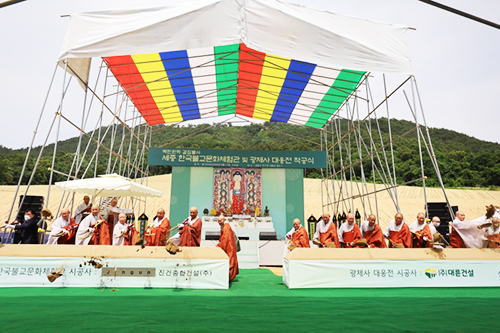Ground-breaking Ceremony for the Korean Buddhist Cultural Experience Center and Gwangje-sa Temple
Page information
Author Jogye On20-06-23 17:37 Views4,955 Comments0Related links
Body
Ground-breaking Ceremony for the Korean Buddhist Cultural Experience Center and Gwangje-sa Temple

A special project was launched in
Sejong City to facilitate the experience of traditional Korean Buddhist culture
and Buddhist religious activities in South Korea’s administrative capital.
On June 17, the Jogye Order Commission on Holy Buddhist Projects marked the
official beginning of the project in the ground-breaking ceremony to build the
Korean Buddhist Cultural Experience Center and the Dharma Hall of Gwangje-sa
Temple in Mt. Jeonwol at San 82, Sejong-ri, Yeongi-myeon, Sejong Special
Autonomous City.
The Jogye Order purchased the land in Sejong City, de facto administrative
capital of Korea, six years ago in 2014 to establish a culture center and a Buddhist
temple that would play a central role in the Buddhist propagation of the
region.
The Jogye Order’s propagation strategy in this region is two-pronged. While the
Korean Buddhist Cultural Experience Center is to provide the residents of this
young, ultra-modern city some access to the traditional cultural resources of
Korean Buddhism, Gwangje-sa Temple will serve as a religious and spiritual
center for the Buddhists living in the area.
The Korean Buddhist Cultural Experience Center and Gwangje-sa Temple will be
constructed on the land area of 16,000㎡ (4,840pyeong).
The former will be in particular built in a grand scale on the site whose total
floor area amounts to 5,495.96㎡ (1,662.5pyeong)
with three stories above ground and one below ground. The Center will be fully
equipped to host various cultural as well as religious functions, such as
Buddhist art exhibitions, Buddhist ritual dance and music performances and Seon
meditation retreats and classes.
<Picture> Architectural drawing of the Korean Buddhist Cultural Experience
Center and Gwangje-sa Templeat Mt. Jeonwol, Sejong City. The Center, with a
traditional Buddhist temple on site, will serve as the most important religious
and cultural institution in the region.
The grand Dharma Hall of Gwangje-sa Temple, whose total floor area will be 306.18㎡(92.6pyeong), is located on the same site as
the Korean Buddhist CulturalExperience Center, and built in a traditional
temple architectural style. The total budget for this project is 500 million
won, which is to be raised through the Million Vows Assembly campaign. The
first stage of the project will be completed by December 2021, which will be
followed by the second stage where other temple structures will be added to the
grand Dharma Hall.
The masterplan set by the Jogye Order of Korean Buddhism is to make Mt. Jeonwol
as a religious and cultural hub that serves not only the four-fold community of
monastics and lay Buddhists, but also all the ordinary citizens living in the
area by improving their standard of living and attracting tourists through the
traditional cultural experiences the Korean Buddhist Cultural Experience Center
and the temple will provide, which will naturally result in the dissemination
of Buddhism in South Chungcheong Province.
The congratulatory remarks offered at the ground-breaking ceremony by VIPs clearly
expressed the intent and direction of the Jogye Order’s vow. In the opening
speech, Most Ven. Wonhaeng, the president of the Jogye Order of Korean Buddhism
said, “The Korean Buddhist Cultural Experience Center, to be built on the slope
of beautiful Mt. Jeonwol overlooking the entire Sejong, will form a core of the
traditional cultural assets in Sejong Special Aunatomous City and neighboring
regions, where not only Buddhists but all citizens can enjoy traditional
cultural resources.”
He continued by saying, “The Constitution of Republic of Korea defines the
preservation and development of the traditional culture as one of the republic’s
key missions, which will reinforce the nation’s competitiveness. We must expand
the position that the traditional culture holds in the nation’s life by making
it available to the public in various ways so that it will be integrated as
part of the people’s daily lives.”
In that respect, the Korean Buddhist Cultural Experience Center will
perfectlycomplement Sejong City and its lack of cultural heritage and
tradition.
Speech after speech followed, made by honored guests as a vow to see the Korean
Buddhist Cultural Experience Center and Gwangje-sa Temple becoming one of
Sejong City’s landmarks. Ven. Jeongmuk (Chairman of the Abbots Council of the
Jogye Order Headquarter Temples) said in his congratulatory remark, “I have no
doubt that this grand project launched today will soon grow into a new
magnificent landmark of Sejong City that will play a pivotal role in promoting
Korea’s superior traditional culture and its Buddhism to the rest of the world.
Today, we are laying a solidfoundation upon which the renaissance of Korean
Buddhism, the stabilization of the Korean peninsula and the world peace will
all be accomplished.
Ven. Bongak, the Chairwoman of the Korean Bhiksuni Association also wished in
her speech that the Center and Gwangje-sa be “a refuge where women, children
and young adults can come and rest anytime, where they can have fun and
meaningful cultural experiences, where families can come and learn how to
meditate in a peaceful environment. I hope they will be far more than just grand
buildings, where the Buddhist culture is kept alive for all citizens.”
Mr. Chunhee Lee, the major of Sejong City also expressed his confidence that the Korean Buddhist Cultural Experience Center and Gwangje-sa Temple will upgrade Sejong beyond Korea’s administrative capital and make it its cultural capital as well. In his congratulatory remark, he said, “The Korean Buddhist Cultural Experience Center and Gwangje-sa Temple will be adorned by parks, lakes and the national arboretum, turning Mt. Jeonwol as the most important site for healing and cultural experiences for all Sejong City residents. I hope someday Sejong will be Korea’s cultural capital as well as its administrative center.”
